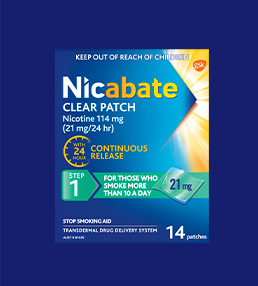
Manage CRAVINGS
We all get cravings. They are our body's way of telling us it's missing something, such as water, sugar or caffeine.
That's why you're almost certain to experience nicotine cravings in the first few weeks after giving up smoking. These tips may help:
- Keep active and increase your exercise, preferably with others. This helps reduce cravings while also improving your mood.
- Snack on fruits, vegetables and whole grains, giving your mouth something else to do other than suck on a cigarette.
- Chew on soft things such as drinking straws or coffee stirrers. But not pencils, or you'll upset your dentist.
- Find a distraction, such as reading a book, listening to music, browsing your favourite websites, or texting a friend.
Overcome ANXIETY
It's normal to feel anxious when you give something up that you really enjoy doing. Unfortunately, feeling anxious is one of the things that might tempt you to give up quitting smoking, or have a relapse. These tips may help:
- Focus on what you need to do to get through the day without a smoke, rather than worrying about how you're going to manage without one.
- Practice relaxation techniques such as breathing exercises and meditation, or having a massage.
- Remind yourself that your anxious feelings will pass with time.
- Reach out to friends or family when you're beginning to feel stressed. The support of loved ones can make a big difference.
- Take some exercise, which boosts the chemicals in your brain that make you feel good. Find an activity you enjoy, such as swimming or dancing, and do it regularly.
- Distract yourself with other things you enjoy doing, such as games, physical activities, and hobbies, which all help reduce stress.
Tackle RESTLESSNESS
You probably know that twitchy feeling when things don't quite feel right. Suddenly taking nicotine out of your system can make it tough to concentrate, sit still, or even sleep. But relax, this won't last forever. In the meantime, these tips may help:
- Remove all technology from your bedroom, giving your mind a rest from your TV, phone, laptop and tablet.
- Try meditating or doing yoga to relax when you’re feeling restless.
- Focus your thoughts with a mantra, repeating ‘I can do this’ over and over.
- An hour before bed, dim the lights; and swap out bright light bulbs for warmer ones.
- Avoid caffeine after 4pm, and relax with a non-caffeinated herbal or green tea instead.
- Turn down the thermostat to 18 degrees, as staying cool helps you sleep better.
- Take some exercise to calm your mind and help you feel contented.
Subdue IRRITABILITY
During the first couple of weeks of quitting, you may feel a bit edgy and short-tempered. This is quite normal, and is your brain's way of reminding your nearest and dearest that you're having a tough time! These tips may help:
- Warn your family, friends and co-workers in advance, letting them know you're quitting and may become irritable or moody.
- Avoid conflict, steering clear of any conversations that may lead to you feeling angry.
- Walk away and calm yourself if a situation escalates.
- Practice mindfulness, sitting quietly with your eyes closed and focusing on your thoughts and surroundings.
- Apologise if you do snap, resolving things quickly.
- Exercise every day, which is good for the body and the mind, and helps release endorphins that will improve your mood.
Relieve FRUSTRATION
Quitting smoking can also make you feel frustrated, as you work to manage your emotions and stay in control. These tips may help:
- Don't let other smokers derail you. Tell friends you've quit and ask them not to smoke around you or offer you a cigarette.
- Try a simple breathing exercise, taking a few deep breaths in through your nose and out through your mouth.
- Write down how you're feeling, then a little later tear up what you wrote and throw it away. This actually helps put things in perspective and sorts out your emotions.
- Remind yourself why you want to quit and how you will feel when you succeed, to help get through those frustrating moments.
It's great that you've chosen to quit. Whether you get one or two of these symptoms or all five of them, remember they won't last forever and in time, they will be replaced with feelings of satisfaction, accomplishment and relief.

















